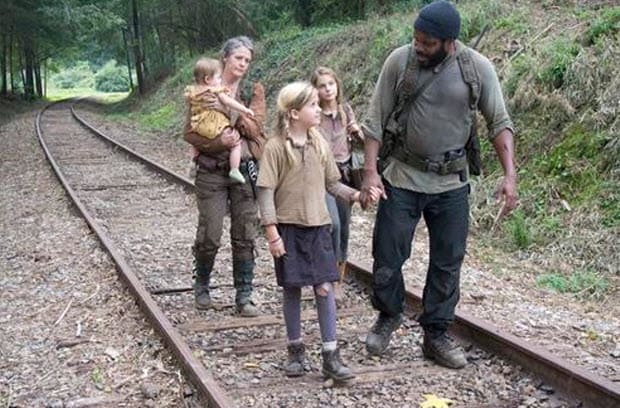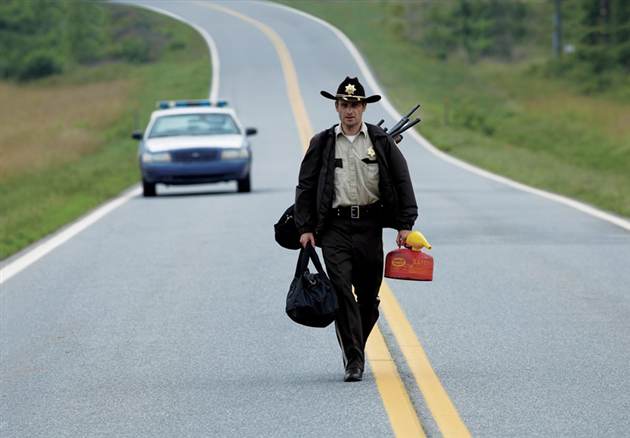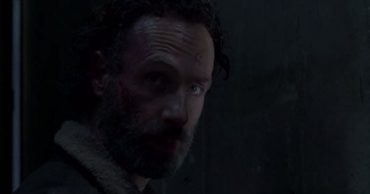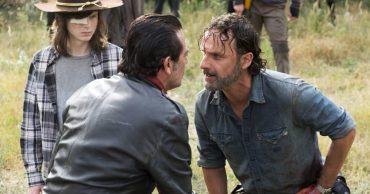
A Shift Back to Familiar Territory
After a surprisingly restrained mid-season premiere, “Inmates” marks a return to the louder, more familiar form for The Walking Dead, picking up the trail of numerous other survivors from the climactic events of “Too Far Gone.” As is often the case with the typical episode of The Walking Dead, there are a few too many characters and not enough interesting stories to go around, which makes “Inmates” an exercise in patience: for every intriguing moment we have with Tyreese or Maggie, we’ve got to sit through the painfully overt characterizations of Beth, Glen, and the like.
I completely understand the wider lens “Inmates” views the world of The Walking Dead through – with only seven episodes to catch up with (and advance) a large set of characters, there’s bound to be a lot of jumping around, especially after the prison group’s been fractured. However, this naturally works against the episode’s intense focus on character: less time with characters leads to thinner, simpler character emotions – like Lizzie’s “subdued” reactions, or Glen’s speech about how believing in believing makes things come true sometimes. In moments like those, “Inmates” suffers: it doesn’t give much room for characters to breathe and give definition to their emotions through their actions. Instead, characters like Beth (whose hilariously awful diary monologue opens the episode) and Daryl (who can only make Sad Face this week) are sold short in ways Rick, Michonne, and Carl weren’t last week (the narrative parallels in that episode only make the argument for fewer characters in an episode stronger).
When Actions Speak Louder Than Words
When “Inmates” works best is when it pulls back and lets the action speak for itself: the chaos of trying to be a father, a teacher, a rescuer, and an executioner made for some of the best Tyreese material of the series, even if it featured way, way, way too much of Lizzie and her sister’s inability to handle the violence and constant stress of living in the same zombie-filled world she’s survived in the last year-plus (something her “unstable”, rabbit-killing sister points out very eloquently at one point). The same goes for Maggie, Sasha, and Bob: when the episode pauses to watch Maggie slowly walk through the bloodied wreckage of the school bus, the tension and emotional weight of her studying zombie faces to see if one is Glenn makes for the most powerful single moment of the episode (even though it would be nice if the script didn’t say “Maggie cries the entire time, in every scene”), the anxiety of the unknown manifesting in a more relatable way than “Run from zombies!”, the show’s go-to source of drama.
It’s almost as if The Walking Dead recognizes this very fact: and in the absence of The Governor, “Inmates” introduces a number of new potential story avenues that wouldn’t need the undead to draw tension from. Tyreese and company run into Carol (who doesn’t quite blow up Rick’s spot about sending her off, at least not yet) and arrive at a “safe place” called Terminus (whose slogan “those who arrive, survive” was heard over the radio a few episodes back), a name that does not sound inviting in any way, especially when you’ve got three small children in tow (and the only one who has any confidence and strength is being portrayed as extremely unstable, a bit of a problematic characterization for me, especially when she’s attempting to suffocate baby Judith to keep the zombies away). Additionally, a passed-out Glenn and Tara run into Abraham Ford and his two running mates – characters from the comic books who will most likely be around for a while; definitely something to pay attention to.
Is Bigger Always Better?
But this begs the question for a show already overflowing with characters: does The Walking Dead need to get any bigger? The deaths of Luke and Molly (two kids from the prison group) would go unnoticed, had a line of dialogue from Lizzie telegraphed the resolution so obviously: there’s no impact to the death of these children, simply because we didn’t know them as characters beyond “some random kids”. Most of The Walking Dead‘s characters have it a little better than that (for example, we’d recognize a zombified Tara or Tyreese if they walked by on-screen), but not a whole lot better, like Beth’s consistently goofy characterization (and googly eyes at Daryl… there isn’t a woman on post-apocalyptic earth who doesn’t want him), or the show’s willingness to paint Glenn as a blind romantic (pushing through an entire group of zombies with the power of love behind him).
With a lot more gunpowder and a lot less quiet, “Inmates” is a clear return to the normal The Walking Dead formula, albeit with a little bit more visual panache than seen in the last couple of episodes of the season’s first half (this episode was directed by Tricia Brock, if you’re wondering). Unfortunately, a perfectly enjoyable episode of The Walking Dead is naturally going to feel less in the shadow of an episode like “After”: without the same connective thread to draw emotional resolutions from, “Inmates” is a lot of fun action and not-so-fun talking, a mix of headshots, awkward crying scenes (Beth’s is just painful), and painfully overt dialogue.
Other Thoughts and Observations
– Beth: “You’re a tracker. You can track.” – she actually says this to Daryl.
– Lizzie guts a rabbit! Oh no: she’s severely unstable! Run for the hills!
– Despite my disdain for Beth’s character, her expedition with Daryl the Pessimist could be a fun one.
– Why doesn’t anyone give that poor, bleeding man a mercy shot to the head? It seems kind of cruel to let him die while he’s crying over the son he just watched get mutilated by Tyreese’s hammer.
[Photo via Gene Page/AMC]
 Follow Us
Follow Us





